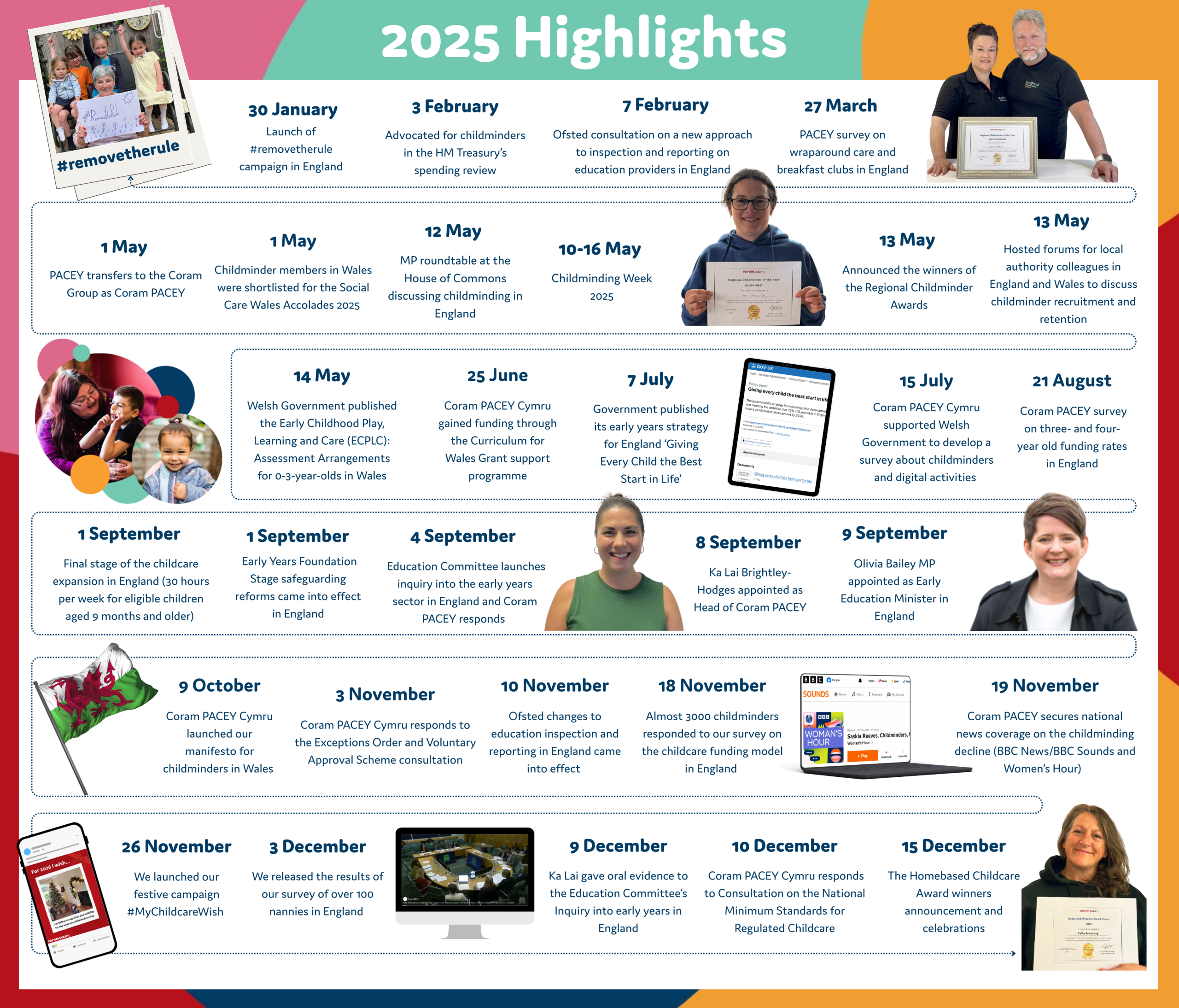Becoming a childminding assistant in England
- Coram PACEY
- $
- Careers in Childcare
- $
- Childminding Assistant
- $
- Becoming a childminding assistant in England
If you are interested in working with small groups of children in a homely environment, then becoming a childminding assistant could be the role for you.
Working under the supervision of, and in partnership with the registered childminder, a childminding assistant will support them in providing high quality care to the children, appropriate learning experiences, and help to ensure their safety and wellbeing. You can find out more about the role of a childminding assistant in our template childminding assistant job description.
Childminder assistants can be an employee in a paid role, or a volunteer in a unpaid role, who works with children under a registered childminder. Therefore, to become a childminding assistant you would need to find a childminder that is looking to recruit an assistant. You may find a vacancy through word of mouth, local jobs boards, or recruitment websites.
Suitability checks
Working as a childminder assistant
Recruitment requirements
Training
Suitability checks
The registered childminder will need to complete the online form Childminders: report new people in the setting – GOV.UK. Ofsted will carry out suitability checks on new adults with council social services.
You will then be contacted directly by Ofsted and must:
- Have an enhanced DBS check with barred lists
- Answer a few questions about your health, other names you have had, where you have lived for the last 5 years and circumstances that might affect your suitability to be in contact with children
Recruitment requirements
You can expect to be asked for a reference when applying for a childminding assistant role. Before your employment can begin, the childminder will require a reference from the last time you worked with children this should be from your current employer, training provider or education setting and have been completed by a senior person with appropriate authority. If you have never worked with children, then you will need to provide a referee from your current employer, training provider or education setting. You can also expect to be asked the reason you are leaving your current or most recent post.
Training
The Early years foundation stage statutory requirements for childminders says that assistants must be “competent to meet their roles and responsibilities.” (para 3.38). You should be prepared to undertake training in order to demonstrate your competence.
Safeguarding training
If you work with children, you have a responsibility to help to protect them. You must be aware of your roles and responsibilities in relation to safeguarding, child protection and the welfare of children. Children are vulnerable and rely on adults to help them to feel safe and secure. You have a responsibility to ensure that children are able to grow and develop in a safe and stimulating environment.
Assistants are required to have training in line with the criteria set out in ‘Annex C: Criteria for effective safeguarding training’ of the Early years foundation stage statutory framework for childminders.
The Safeguarding children for staff course from Coram PACEY has been designed to help you meet your responsibilities and fulfils the criteria of Annex C relevant for childminding assistants and is a NCFE’s ‘Cache Endorsed Programme’. It will help ensure you have the confidence to recognise, respond to and refer a child for further help if you should have any concerns.
First aid training
It is considered best practice for assistants to hold a paediatric first aid (PFA) certificate as the registered childminder should take into account the number of children, assistants, and layout of premises to ensure that a paediatric first aider is able to respond to emergencies quickly. With parental/carers permission, children may be left in the sole care of childminders’ assistants for up to two hours in a single day – in these circumstances the assisstant must hold a current paediatric first aid certificate.
The certificate must be for a full course consistent with the criteria set out in Annex A: Criteria for effective Paediatric First Aid (PFA) training. PFA training must be renewed every three years and be relevant for people caring for young children and babies.
PACEY works with Tigerlily Training to provide a suitable paediatric first aid qualification, ideal for your initial training.
The course is delivered by experienced tutors with an understanding of childcare settings. Their experience in delivering learning will give you the knowledge, skills and confidence required to effectively administer first aid, as well as meet the requirements of registration.
Food safety and hygiene training
Childminders must be confident that their assistants who are responsible for preparing and handling food, are competent to do so.
For you this means that:
- ensuring you are given information about any special dietary requirements, preferences, food allergies and intolerances that the child has, and any special health requirements,
- ensuring you are given information from parents and/or carers and, where appropriate, health professionals in regard to any allergy action plans for managing any known allergies and intolerances,
- knowing how to prepare food in a way to prevent choking,
- keeping children in sight and hearing while they are eating,
- sitting facing children whilst they eat, so you can make sure children are eating in a way to prevent choking and so they can prevent food sharing and be aware of any unexpected allergic reactions.
Our Level 2 food safety and hygiene for early years settings course will give you the guidance you need. Accredited by the Royal Society of Public Health (RSPH), our course provides learners with up-to-date food hygiene information, case studies, interactive exercises and videos to ensure learners are aware of their food safety responsibilities.
Delivering the Early years foundation stage
Coram PACEY’s short CPD course ‘Delivering the Early years foundation stage‘ explores the requirements of the EYFS statutory framework for childminders and how these may be delivered in your setting.
Child development training
If you are new to early years, or want to refresh and update your knowledge, the government’s free Early years child development training will give you a thorough understanding of the most important aspects of child development in the early years, including reception years.
Preparing to Work in Home-based Childcare course
Our Preparing to Work in Home-Based Childcare (HBCA) is a level 3 award that covers every aspect of childminding, including: child nutrition; costs and charges; meeting children’s learning needs and working in partnership with parents and other professionals.
If you choose to go onto register as a childminder yourself, the HBCA course has been created by childcare experts to give you the very best foundations for a successful career as a childminder in England.
Working as a childminding assistant
Once you have successfully commenced in your role as a childminding assistant, it will be important to work through an induction process with your employer to help you understand your role and responsibilities, how the service runs, and to be able to implement the settings policies and procedures.
It will also be important to continue to learn and develop in your role through regular supervision and appraisal, and by seeking opportunities for Continuous Professional Development. Coram PACEY Practitioner Assistant membership offers access to free training.

Latest News
Keep up to date with everything that's happening in the childcare sector
Reflecting on an important year
As we start to wind down before the festive break, I would like to take the time to reflect back...
Home-based Childcare Awards 2025: The winners
Coram PACEY is delighted to announce the winners of our Home-based Childcare Awards! This year, we...
Coram PACEY statement: An update on MTD for childminders (17 December 2025)
Ka Lai Brightley-Hodges, Head of Coram PACEY comments: “Following our webinar with HMRC on 11...





